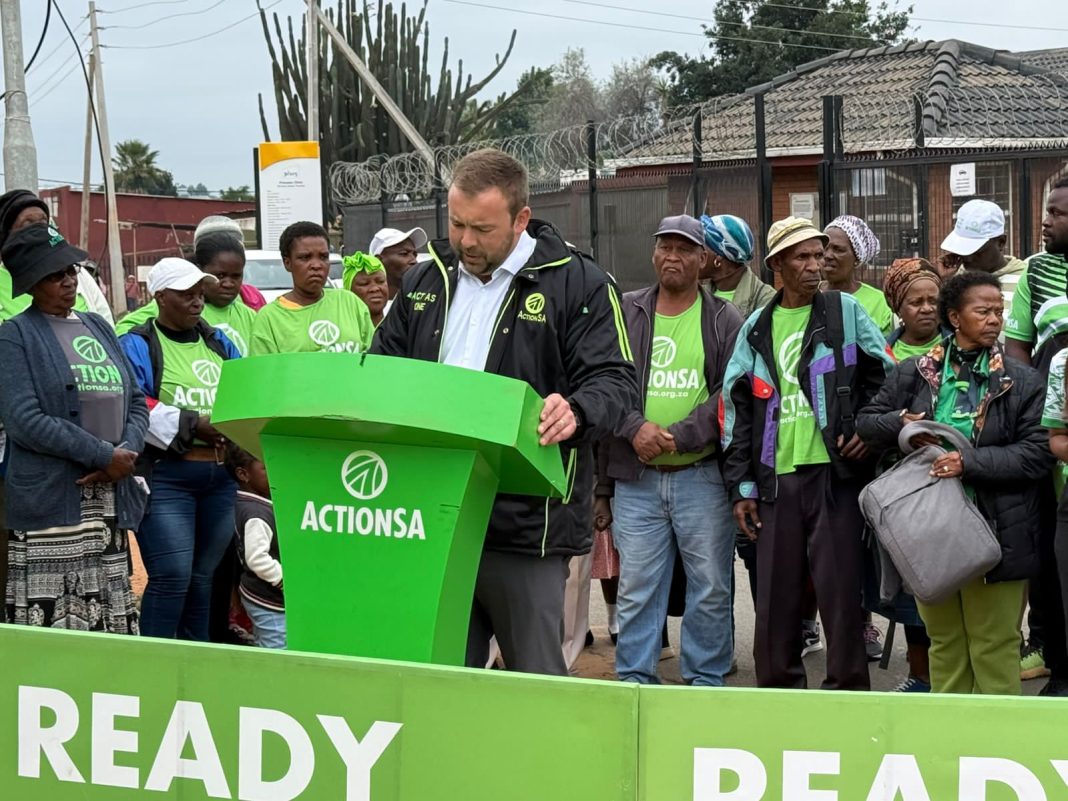By Johnathan Paoli
ActionSA national chairperson Michael Beaumont has lauded former Johannesburg mayor and party leader Herman Mashaba’s record in delivering “tangible” improvements to residents, describing him as the only mayor in a decade to truly fix Johannesburg.
Beaumont delivered his remarks at the Princess Clinic in Roodepoort during the latest leg of the Mashaba Legacy Tour, a campaign aimed at reminding residents of Mashaba’s achievements.
Speaking to residents gathered outside the clinic, Beaumont said Johannesburg’s succession of failed administrations under the African National Congress, Democratic Alliance and smaller coalition parties had led to collapse, with nine mayors in 10 years and no progress on basic services.
“Only one of them succeeded in delivering tangible, positive change. That was Mayor Herman Mashaba,” he said.
The Princess Clinic was one of the first public health facilities to benefit from Mashaba’s Extended Hours Clinics programme, launched during his tenure to provide after-hours healthcare in underserved communities.
Beaumont recounted how the initiative was inspired by Mashaba’s interaction with the Maziko family, who lived nearby.
Their eldest daughter, he said, suffered from tuberculosis and seizures but struggled to access care after hours.
Faced with budgetary limits during his first nine months in office, Mashaba reallocated R9 million that had been set aside for the former mayor Parks Tau’s international travel to fund a pilot project extending the clinic’s hours.
After the trial’s success, the programme expanded to 27 clinics across Johannesburg.
According to Beaumont, more than 300,000 patients were treated after hours, and 522 emergency cases were handled thanks to the extended hours initiative.
Mashaba’s approach, Beaumont said, reflected a mayor who listened to residents and followed through on his promises.
During his three years in office, Mashaba’s administration opened six new clinics, procured nine mobile clinics, and established five free community-based substance abuse centres.
Beaumont highlighted Mashaba’s broader record of delivery, contrasting it with what he described as the “years of political musical chairs” that followed his resignation in 2019.
“In six years since Mashaba left office, only three more clinics have extended their operating hours. That’s the difference between leadership that delivers and leadership that collapses,” he said.
He said Mashaba’s administration had achieved record levels of resident satisfaction, reaching 74 percent, the highest in the city’s history, by redirecting more than R2 billion from luxury expenses and wasteful spending toward core service delivery.
Under Mashaba’s leadership, power outages declined from 6.1 to 5.8 per year during periods of peak load shedding, while water leaks and bursts were reduced from 45,000 to 37 000 annually, said Beaumont.
During his tenure, the city resurfaced 900 kilometres of roads, representing almost a quarter of all deteriorated road surfaces across Johannesburg, and facilitated R17 billion in new investment during the 2018/19 financial year.
Beaumont added that Mashaba’s government delivered 7 000 RDP homes, issued 7,500 title deeds, and provided 3,500 serviced stands to residents in need.
“These were not symbolic gestures; they were real, measurable changes that improved lives and proved that clean, efficient governance is possible in Johannesburg.”
Beaumont said the Mashaba Legacy Tour was not merely about nostalgia, but about restoring confidence in Johannesburg’s potential.
“Residents see the metro crumbling, leaders fighting for positions instead of solutions. They must be reminded that this city once worked and can work again,” he said.
The Mashaba Legacy Tour is expected to continue through several other Johannesburg communities.
INSIDE METROS

